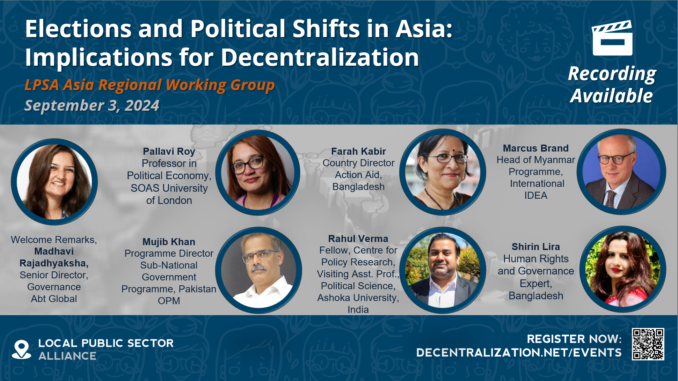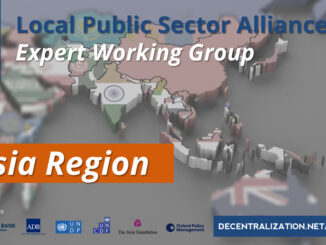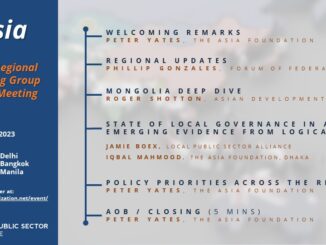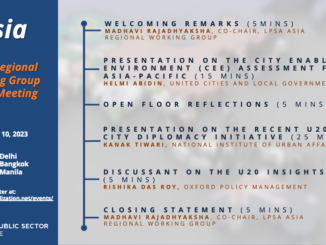
The Local Public Sector Alliance’s (LPSA) Regional Working Group on Asia – Knowledge Sharing event took place on September 3, 2024 (6:00 AM EDT; 11:00 AM BST; 3:30 PM IST; 5:00 PM BKK; 6:00 PM Manila). The panel discussion was opened by Madhavi Rajadhyaksha, Senior Director and Head of Practice at Abt Global, who serves as one of the co-chairs of the LPSA Asia Working Group.
The event explored the rapidly evolving political landscape in Asia, particularly how recent elections and leadership transitions at the national level potentially impact decentralization and influence local governance and decision-making. Experts shared insights on the implications of these elections for decentralization and local governance in Asian contexts. The panel discussion, themed “Elections and Political Shifts in Asia: Implications for Decentralization,” was moderated by Pallavi Roy, Professor of Political Economy at the School of Oriental and African Studies, University of London.
Farah Kabir, Country Director at ActionAid Bangladesh, shared insights on Bangladesh’s current political transition following the July Revolution, a student-led movement against discriminatory quotas in government jobs. She provided a historical overview of decentralization efforts in Bangladesh, starting with President Ershad’s military regime. While Ershad’s initiatives aimed at decentralizing various sectors, they faced challenges in social and human aspects. Despite these challenges, local government initiatives, such as the rural electrification program, led to improvements in health and literacy rates. However, issues of political centralization and a lack of genuine local democracy persisted, especially with the shift towards party-based local elections. Kabir emphasized the importance of community engagement and education in budget governance and concluded by highlighting the massive administrative challenges in managing such a large population.
Marcus Brand, Head of Myanmar Programme at International IDEA, highlighted the aftermath of Myanmar’s February 2021 military coup, where the military took control citing the 2008 constitution. Despite international condemnation, neighboring countries and ASEAN continue engaging with the junta. Brand noted Myanmar’s historical lack of local governance and the current improvisation by communities to create autonomous local governance structures in liberated areas. He drew lessons from Nepal’s constitutional building period, noting that Nepal’s approach to local government, including constitutionalization and affirmative action, offers a valuable model for Myanmar. However, Myanmar faces challenges related to governance and decentralization, with ethnic armed organizations providing selective services in conflict-affected areas. Brand emphasized the need for Myanmar to balance continuity and reform, drawing from Nepal’s experience in building effective local government.
Shirin Lira, a human rights and governance expert, discussed recent developments in Bangladesh, describing them as a revelation and an opportunity for rebuilding. She highlighted the July Revolution, which evolved from a quota reform movement into a broader fight against discrimination and regime change. Lira emphasized the central role of students, youth, and the public, while criticizing Bangladesh’s lack of democratic practice, institutional corruption, and centralized governance. She stressed that true decentralization and democratic practices have long been absent, posing challenges and opportunities for the future. She also discussed the complications posed by Bangladesh’s political and administrative crises, impacting local governance, and highlighted the importance of cautious and strategic engagement in fragile contexts.
Mujib Khan, Senior Principal Consultant at Oxford Policy Management, highlighted Pakistan’s ongoing political instability and its hybrid governance system, where the military wields significant influence. He discussed numerous political upheavals, including military coups and judicial dismissals of elected leaders, with civilian governments struggling to sustain democratic governance. Despite reforms, power remains centralized, particularly in provinces like Punjab and Khyber Pakhtunkhwa (KP), which have curtailed local governance efforts. Khan discussed the challenges of fiscal decentralization, noting that while higher governments advocate for devolution, they often undermine it by limiting resources and authority for local governments. He pointed that fiscal decentralization is critical for effective service delivery, yet provinces frequently reduce local government revenues through various methods, such as controlling tax levies and excluding local governments from essential services like health and education. This results in limited local autonomy and ineffective service delivery. Khan suggested that stronger constitutional provisions might ensure proper fund allocation to local governments, as current practices lead to local governments receiving only 5% of their revenue from own sources, with the rest controlled by provinces.
Rahul Verma, fellow at the Centre for Policy Research, India, highlighted India’s struggle to translate its legal framework for decentralization into effective governance practice. Despite the constitutional provisions outlined in the 73rd and 74th Amendments, true decentralization remains largely symbolic. Central and state governments continue to dominate financial management, policy decisions, and resource allocation, leaving local governments with limited autonomy. Verma noted the uneven devolution of powers across states, with some showing greater commitment to decentralization while others retain centralization. He emphasized the significant role of bureaucracy and the need for financial autonomy, as local bodies often face resource constraints. Without genuine fiscal devolution and focused capacity-building, India’s decentralization efforts will continue to fall short.
Pallavi Roy summarized the panel discussion by highlighting key themes of decentralization, authoritarianism, and political representation and the topics explored by the panelists – effectiveness of decentralization amidst populism, authoritarianism, and weakened democratic systems. The discussion emphasized how local governments have been undermined in countries like Bangladesh due to discredited institutions and a lack of participatory decision-making. Roy pointed out that decentralization has often been manipulated for political purposes, citing examples from South Asia and Nepal. She stressed the political nature of decentralization and its impact on local governance. Additionally, Roy discussed the significance of informal networks in countries like Myanmar, where formal rules often contradict the actual distribution of power. The discussion highlighted the challenge of balancing formal and informal governance structures, and the difficulties faced by donors and practitioners in authoritarian regimes. Roy emphasized the need to understand how decentralization affects empowerment and the crucial role of donors, while noting that true change must come from within the communities themselves.
The panel discussion was followed by Q&A sessions. Madhavi Rajadhyaksha concluded the meeting with scheduling the next quarterly meeting.
A video of the meeting is available on YouTube. The links below provide access to the video segments of the different agenda items.
| Agenda Item | Contributor |
| 1. Welcome and Introduction | Madhavi Rajadhyaksha Asia Working Group Co-Chair Pallavi Roy Moderator School of Oriental and African Studies, University of London |
| 2. Insights from Bangladesh | Farah Kabir ActionAid Bangladesh |
| 3. Insights from Myanmar | Marcus Brand International IDEA |
| 4. Implications of Bangladesh’s Political and Administrative Crises on Local Governance | Shirin Lira Human Rights & Governance Expert |
| 5. Insights from Pakistan | Mujib Khan Oxford Policy Management Pakistan |
| 6. Insights from India | Rahul Verma Centre for Policy Research India |
| 7. Moderated Q&A | Pallavi Roy |
| 8. Closing & AOB | Madhavi Rajadhyaksha |
The next Asia Knowledge Sharing event is scheduled on December 3, 2024 – Register Here.
Reminder: You can join any LPSA Expert Working Group free of cost and receive reminders and updates by opting-in to one or more working groups as part of your LPSA Membership registration.




